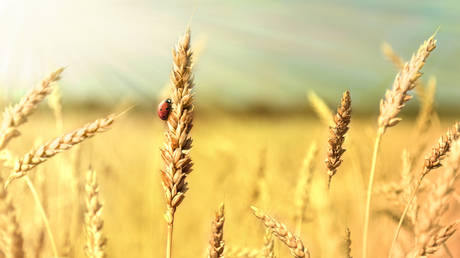Russia's wheat harvest is under threat: Is the world headed for global hunger?
Rising grain prices and disruptions of supplies are raising concerns of a looming global food crisis. source:TROIB RTS

Rising grain prices and disruptions of supplies are causing fears of a looming crisis
Russian Agriculture Minister Dmitry Patrushev warned on Friday that the ministry sees risks of the country’s grain harvest target not being reached this year. The amount of grain harvested across Russia so far is lower than this time last year, he said. This could force the ministry to review its plans for grain exports, which could negatively affect the global market for the commodity, the minister added. Shortages of grain have already pushed prices higher across the world and raised concerns of a possible food crisis.
- What’s behind the rising grain prices?
A number of factors have combined to impact the supply of grain to the global market, thus fueling food security concerns. These include the Covid-19 pandemic, the crisis in Ukraine and subsequent sanctions against Russia, as well as environmental factors such as the record heatwave in Europe, which threatens this year’s harvest. - How did the problem start?
Global food security concerns were first raised in 2020 during the pandemic. The health crisis had a devastating impact on the global economy both directly and through government measures aimed at trying to slow the spread of the virus. The disease itself and efforts to contain it are still causing disruptions to the supply of agricultural goods. - How are events in Ukraine having an impact?
The conflict in Ukraine and subsequent sanctions against Russia limited the two countries’ agricultural exports, thus significantly exacerbating the global rise in grain prices that had begun amid the pandemic. Both Russia and Ukraine are major suppliers of grain to the world market. - What has been the impact of anti-Russia sanctions?
After the start of Russia’s military operation in Ukraine, major shippers have avoided the two countries’ Black Sea ports, which are major export hubs for grain. The problem is twofold: the conflict itself and fear by international shippers of facing secondary sanctions for taking on Russian grain. - What about Ukrainian ports?
Ukrainian shipments of grain have been affected because the country’s remaining ports in Odessa and Chernomorsk had been mined amid the ongoing conflict, which prevented cargoes from departing for five months. However, negotiations between Russia, Ukraine, Turkey and the UN produced an agreement that has allowed shipments to resume. The first vessels with Ukrainian grain left a Black Sea port on Monday, followed by another three ships on Friday. - How have surging prices impacted supply?
In response to growing grain prices, major agricultural exporters, such as India and Kazakhstan, have been forced to halt grain exports altogether to bring domestic prices under control. As a consequence, many grain-importing nations are facing rising food prices and shortages. - Which countries face the biggest impact?
The biggest impact of rising food prices has been felt in Sri Lanka. The island nation has been in a state of unrest for several months, with food and fuel in short supply and prices skyrocketing. Tensions escalated in July when thousands of protesters stormed the president’s residence, forcing him to flee. African states and other poorer countries also face a critical problem because they rely on grain imports to feed their populations. - How are wealthier countries impacted by rising food prices?
Developed nations face problems of their own. Rising food prices have been the main driver of inflation and higher costs of living, which have already caused a dramatic economic slowdown in the West. Despite denials by the Biden administration, the US economy has officially entered recession after two consecutive quarters of negative GDP growth. According to the latest projections, the UK and the EU are also on the brink of recession.
Find more stories on Business, Economy and Finance in TROIB business












